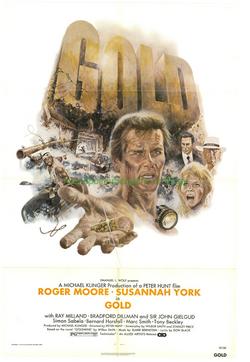From Wikipedia, the free encyclopedia
| Gold | |
|---|---|
| Theatrical release poster by Tom Jung | |
| Directed by | Peter R. Hunt |
| Produced by | Michael Klinger |
| Written by | Stanley Price Wilbur Smith |
| Based on | Gold Mine by Wilbur Smith |
| Starring | Roger Moore Susannah York |
| Music by | Elmer Bernstein |
| Cinematography | Ousama Rawi |
| Production company | Hemdale Film Distribution Ltd. |
| Distributed by | Allied Artists (USA) |
| Release date | 5 September 1974 |
| Running time | 120 minutes |
| Country | United Kingdom / Republic of South Africa |
| Language | English |
| Budget | GB£1,000,000 or $2 million |
| Box office | £454,538 (UK by 1975) |
Gold is a 1974 British thriller film starring Roger Moore and Susannah York and directed by Peter R. Hunt. It was based on the 1970 novel Gold Mine by Wilbur Smith. Moore plays Rodney “Rod” Slater, General Manager of a South African gold mine, who is instructed by his boss Steyner (Bradford Dillman) to break through an underground dike into what he is told is a rich seam of gold. Meanwhile, he falls in love with Steyner’s wife Terry, played by York. In the United States, the film was only released as part of a double bill.
The movie is based on a 1970 novel by Wilbur Smith.
The story was based on a real-life flooding of a gold mine near Johannesburg in 1968. Smith researched the book by working in a gold mine for a few weeks. “I was a sort of privileged member of the team, I could ask questions and not be told to shut up”, he says.
Roger Moore was cast in the lead. It was his first film since making his debut as James Bond in Live and Let Die (1973). He was paid $200,000 plus a percentage of the profits. Producer Michael Klinger used a number of other people associated with James Bond films, including editor John Glen, production designer Syd Cain, titles designer Maurice Binder and director Peter Hunt.
Tony Klinger, assistant to the producer, said he tried to get Steven Spielberg to direct the movie after having been impressed by Duel. However Roger Moore vetoed the choice on the basis of Spielberg’s youth. “Roger was, I think, a little insecure about his acting ability, and as a consequence was always protective of his image, like most movie stars that are less actor and more star. I guess that’s why we got the message loud and clear that he turned down our first choice for the director for Gold,” he said.
The film was controversially filmed in South Africa under the apartheid regime, with scenes shot at two large mines, Buffelfontein and West Rand. “We had to drop down two miles, which was horrendous,” said Moore. “It was great to start with, and I got tremendously enthusiastic about the mine, but after ten days down there it got very claustrophobic.”
Some scenes were filmed at Pinewood Studios in London.
The British film union, ACTT, put a black ban on the movie because its members were forbidden to work in South Africa. The Union suggested the film be shot in a mine in Wales instead but the filmmakers refused, claiming Wales looked nothing like South Africa. Some members defied the ban.
Bradford Dillman later recalled “Susannah York, a militant liberal, used every publicity opportunity to deplore the conditions of the black miners, despite pleas from the producers to cool it.”
The complexity of filming the final flood scenes resulted in the movie going over budget.
Klinger tried to sell the film to companies such as British Lion, Anglo-EMI and Rank, but was rejected. He succeeded in selling the film to Hemdale.
The film was popular at the box office – it was one of the 19 most popular films at the British box office in 1974 – enabling Klinger to raise finance for Shout at the Devil.
The Los Angeles Times said the film “is everything people have in mind when they talk about a movie movie. Its hero is heroic, its heroine is beautiful and kittenishly sexy, its villains are outrageously villainous, its characters crustily colorful. It has scope, scale, surprise. It has more punch than a 15 round fight and more corn than Kansas. It is a travelogue of South Africa and a fascinating audiovisual essay on gold mining.”
| Award | Person |
| Nominated: | |
| Best Original Song (Wherever Love Takes Me) | Elmer Bernstein Don Black |
Watch the movie “Gold”



![Righteous Brothers – [You’re My] Soul And Inspiration Righteous Brothers – [You’re My] Soul And Inspiration](http://img.youtube.com/vi/mzrPs-hLKmM/0.jpg)
































































Comments